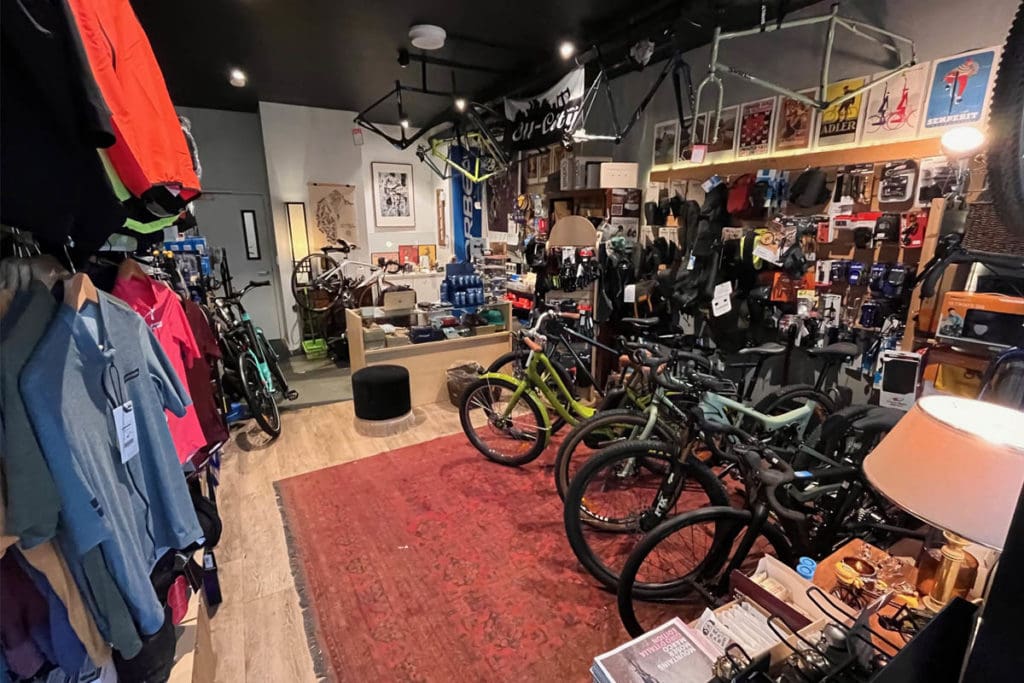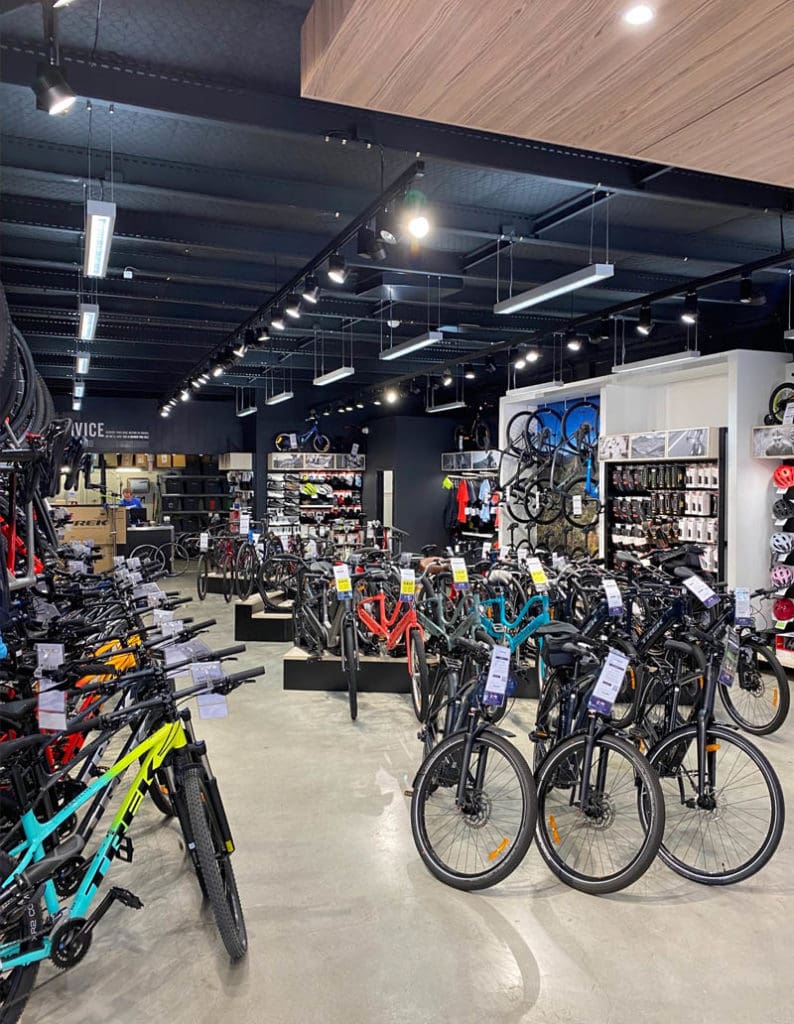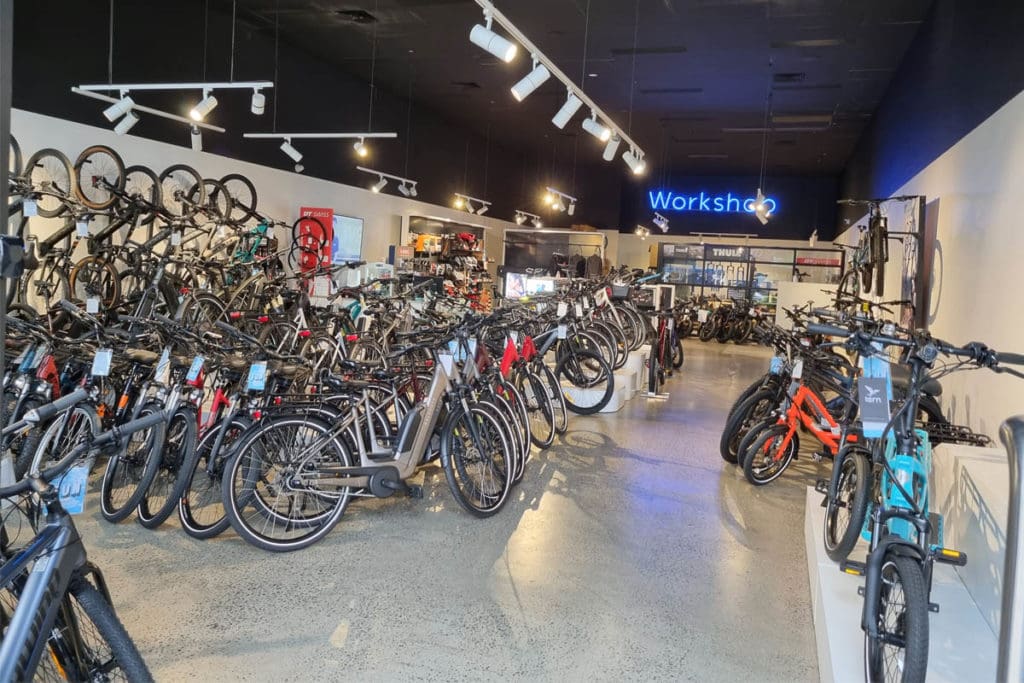How’s Business? – October 2022

Welcome to our monthly check-in with bicycle retailers across Australia and NZ.
While sales trends varied slightly between this month’s featured businesses, the messaging on services was consistent – workshops have never been busier.
As always, in addition to asking “How’s business?” we asked a follow up question. This month’s question was: “What is it your customers love most of all about your business – that really sets you apart from other bike stores?”
Phil Hopkins, the owner-operator of “keyhole” Kingston Foreshore Cycles in the upmarket ACT suburb of Kingston, says:
It’s pretty quiet actually. It’s been a very funny time. We had a very quiet winter.
We’ve just entered our fourth year in this business. It was an interesting to start Kingston Foreshore cycles because we virtually went straight into Covid. I thought that would be dire but, like everybody else, it went berserk and so we had a rocketing three years, in which everything was going incredibly well.
“I’ve had a lot of people coming in say they’d rather resurrect a bike than have to buy a new one.”
Then this winter I thought ‘gee it’s a bit quiet’. Talking to my colleagues they said ‘it is Phil but it’s not that quiet, you just haven’t experienced your proper winter’.
Like everybody else, we’ve gone from having high demand but difficulty getting stock, to having a shop full of bikes but no one buying – so it was kind of weird.
Then at the first sniff of spring, which was the last week of August, suddenly ‘bang’ it was on again. We had a couple of great weeks, then it went very quiet again.
My feeling is that people are being very cautious with how they spend their money. We’ve seen a big increase in servicing. I’ve had a lot of people coming in say they’d rather resurrect a bike than have to buy a new one.
I think that’s a consequence of people tightening their belts with mortgage rates and all the rest of it.
Traditionally, we have a very strong commuting clientele. We’re a Lekker dealer and now our e-bike range continues to be very strong. But once again, it’s that commuting e-bike. The least expensive e-bike I sell is about $2,000 and through to about the $3,500 to $4,000 mark, they’re doing very well … as they always have. But once you get over $4,000, the pickings are much slimmer. Whereas previously, the market $6,000 has been very strong, bikes were just walking out the door during Covid.
We also do Orbea and Benno, through Cargocycles in Melbourne. Benno has been a really good brand for us.
We also specialise in gravel bikes, bike packing and touring. That side of the business has always been extremely healthy but I’m finding that bikes over $3,000 have really slowed. People are asking ‘can I do something for under $2,000?’.
We’re a keyhole bike shop. They are traditionally difficult to make work in the Canberra scene which, like everywhere, is dominated by the big retailers. There’s not point replicating what the big retailers in town are doing. This is my idea of a tiny shop with an awful lot in it. We’re packed to the rafters.
We’re in a village atmosphere – a couple of cafes and a wine bar – so it seems niche but I’ve worked very hard to make it accessible. We do Salsa, Surly, Bombtrack and Orbea, which also has bikes in the commuter range.
I’m about to become a Brompton dealer.
I’ve also very much picked up from people there’s a trend for people wanting to go back to their local dealer, to go to a small dealer. They want that personal contact, so we work pretty hard to do that. We’re finding that people, certainly here, if they can stay and shop in their village, they will.
Covid certainly planted that culture, with people working from home and unable to get out. Our area here is pretty affluent, they’re white-collar workers and they were working from home.
I think the whole environmental, global warming awareness, reducing your carbon footprint, that culture has influenced this trend as well. And rising interest rates and rising fuel costs have led people to think ‘how can I reduce my expenses?’.
Interesting times.
P&A sales are consistent. They just keep going but, once again, we used to do very well with all the travel stuff – Ortlieb panniers, racking, gravel tyres, the whole thing was very strong – and I’ve even noticed that has pulled back significantly.
What is it your customers love most of all about your business – that really sets you apart from other bike stores?
It’s the personal contact, ongoing support and open availability. We very much work on being the traditional neighbourhood bike shop where you can just walk in and as much as we can, we’ll do whatever we need to do on the spot. I just had a guy come in who needed his gears adjusted on his high-end road bike. He said he just didn’t know what he was doing and he couldn’t get anyone else to do it. I said if it all goes well, I can do it in about 15 minutes, if you’re prepared to wait. He almost fell over backwards. He couldn’t believe it.
If we can do that, and 99% of the time we can, people really appreciate that.
I’m very hands-on. So people feel they really know me and I can be with them for the entire journey. That comes with being a very small shop. My retail space is 20m2.
I’m the owner-operator and I’m in the shop five days a week. We’re open seven days a week and I have four casual staff on call. At the most, because of the size of the shop, we might have three people on the floor and that’s generally only on weekends.
I was a career english teacher with a lifelong passion for cycling. Got experience working for a friend, John Ross, when he bought Lonsdale Street Cyclery. Did a lot of pair racing together. Was transitioning out of cycling and did three years at Lonsdale Street Cyclery. That was my apprenticeship and led me to think I could do this.

Jono Lewis, the manager of Trek Bicycles Leederville, in inner Perth, said:
Heading towards summer, there’s a lot of people getting their bikes serviced at the moment, so that’s really picked up.
Over winter, we’ve been quiet, for sure, but the past two or three weeks have really picked up. The better weather and improving infrastructure are probably contributing, and we have a really big charity ride, the MACA Cancer 200 – Ride for Research, coming up. That raises a lot of money and this year’s they’ve had to cap the number of riders to 1,700 people. A lot of people are getting their bikes serviced specifically for that.
We’re also feeling the impact Jai Hindley has had with the juniors. He’s definitely got a lot of people into cycling here. There was an impact with Cadel Evans winning the Tour and but a 26-year-old from Perth winning the Giro is even more relatable. [Editor’s note: On Saturday, Jai Hindley was honored with a civic ceremony in his home town of Perth, five months after the Team Bora-Hansgrohe rider became the first Australian to win the Giro d’Italia.]
If you’re to compare the number to peak Covid, we’re definitely down. But it’s certainly ramping up again.
“This will be the first time the Leederville store will looking for two mechanics. It’s never been this busy for servicing.”
We were down about 25% this winter compared to last winter. It was very consistent all year in 2021, whereas we had a noticeable downturn for about two months this year.
There’s definitely a lot of fair-weather riders in Perth but you think about how the gravel scene has picked up, that has kept a lot of people going out, so has the better technology for indoor riders. We’re consistently selling endurance road bikes, gravel bikes and even hardtails. You go out on the Heritage Trail here and you see a lot of cyclists there every weekend.
Even the gravel event, Seven, down south has become a UCI-recognised event (one of two Australian rounds in the 2022 Trek UCI Gravel World Series). When that comes to town, that will definitely help us as well.
This will be the first time the Leederville store will looking for two mechanics. It’s never been this busy for servicing. Because Trek offers a 24-hour turnaround with servicing, that’s a firm commitment we have to stay on top of, while making sure our bookings don’t stretch out too long.
In Leederville in particular, the road market has aways done really well. Gravel has really taken off. Kids bikes have always been pretty steady and because we’re so close to the bike path here in Leederville, the commuter bikes are doing really well.
A lot of manufacturers are starting to catch up after Covid. Our parts manufacturer is Shimano, we’re starting to see them catch up. So, in turn, we’re starting to receive more bikes.
Right now we’re doing quite well in terms of stock. Because of Covid, our buying team had to really up their game.
What is it your customers love most of all about your business – that really sets you apart from other bike stores?
The people that work here. It’s a really small team, just the four of us, and we have a really good rapport with our regulars. If they come in two or three times, we know everyone’s names. In July, we won the hospitality store of the year award for all Trek stores in Australia. All four of us are pretty tight and that translates really well in the store. We’re really good mates outside the shop. We all ride with each other on the weekends and go out for dinner and drinks. We all try to be as relatable as possible with customers and we share the same goal to make people happy with their bikes and their riding experiences.

Andrew Haddy, the manager e-bike specialist Crooze Electric, in the Gold Coast suburb of Bundall, says:
Business has quietened down a little bit as interest rates have gone up. People through the door has quietened off but internet sales are still going fairly smoothly.
This particular business has been going for two and a half years, but before that the previous owner had a smaller store that was more of an e-bike hire shop. He was going for five or six years. The current owner, James Patten, has expanded it dramatically over those two years. It’s a rapidly growing business.
We are unique in that we only sell electric bikes, e-scooters, electric skateboards and one-wheel boards. Our main stock is definitely bikes.
We do a good 75% of our sales online but there are certain brands we stock on the floor, such as Focus, Kalkoff, Specialized, that can’t be shipped and are pick-up in store only. Online, we do Rocky Mountain, Orbea, Smartmotion, NCM Bikes and Dyson. We’ve got two and a half people working full-time on our website.
We seem to have a lot of success with e-mountain bikes and we’re pretty successful with Focus, probably because they’ve had the most stock in recent times. Specialized we do fairly well with and Orbea is a specialist field. Mountain bikes is just our niche in the market. We do a lot of advertising on Google and social media.
We just started stocking Trek and Electra and the Electras will probably be a good market over summer.
As far as a touring bike or conventional bike, Kalkhoff does well for us. In the lower price range, we do well with Smartmotion. The wholesalers are based here on the Gold Coast and it’s very good for parts backup.
Supply in general is starting to come good now. We’re the most stocked we’ve ever been in the past two years. We’re geared up for what will hopefully be a good Christmas season. Electric scooters are a bit scarce but shipments are due at any moment. As far as bikes are concerned, we’re comfortable.
On the Gold Coast, there would be 40 or 50 stores selling scooters but there’s probably only five of us that do repairs. The big problem with scooters is they’re very hard to work on and most bike shops won’t touch them. We’re very selective on which brands we keep because some are much easier to work on that others, and some are much easier to get parts for. At the moment, we’re doing Zero, VSETT and a local brand Machine, and Mercane. They’re all distributed locally.
We’ve bought a warehouse now and our accessories stock has significantly increased. We’re doing clothing: Troy Lee, Fox, Specialized and we’ve just got O’Neal. We set up a temporary shop at Cairns for Crankworx and sold a fair bit of Troy Lee gear.
What is it your customers love most of all about your business – that really sets you apart from other bike stores?
It would be service, especially the online side of things. We pride ourselves on being very fast and efficient. In this day and age, with everyone buying on the internet, a lot of people have had bad experiences, so if you can give them a better, more efficient service than they’ve had previously, they’ll come back to you.
We have a very good display in a very good-looking shop and it’s well stocked at the moment.
Second-generation bike store owner Peter Giessauf, at International Cycles in the inner Adelaide suburb of Stepney, says:
Sales are very slow for bikes. Kids bikes, normal commuter bikes, it even feels like the electric bike scene has gone a bit quiet. Top-end bikes are still hard to purchase but I’m extremely busy with repairs. That may be influenced by rising fuel prices, summer is coming and the Tour Down Under is back on.
“I’m doing a lot of retro stuff, people doing up their old ’70s and ’80s bikes in the retro racing bike scene.”
People are also getting ready for the community rides, especially the charity rides. There’s a few of them coming up. They tend to get their roadies in ship shape to do those events.
They’re coming into the store in pretty bad condition and going out looking like new.
I’m doing a lot of retro stuff, people doing up their old ’70s and ’80s bikes in the retro racing bike scene. I don’t know what’s happening interstate but it’s very popular here. Other stores are sending people here with their retro bikes because they don’t want to touch them.
I’m keeping Brian Hayes, the frame builder and painter previously out of the AIS (Australian Institute of Sport), very busy doing a lot of repaints on these restored old bikes.
Retro bike restorations have been popular for a good five to six years. You’ve got the big grand fondo ride in Brisbane every two years, for steel bikes only with bar levers. Some of the steel bikes I’ve done recently have been for that purpose.
A lot of people who’ve got $20,000 carbon fibre bikes, full racing machines, they tend to ride their old steel retro bikes because they’re most bloody comfortable.
I’ve also got people doing up bikes from the ’40s and ’50s as well. They’re getting me to strip them down and hunt around for bits and pieces for them. I haven’t got time to sell new bikes.
In terms of new bikes, Fuji might be getting some bikes by Christmas time, Pinnarello are next year some time, Trek has some coming through but it’s not the high-end models because of a componentry shortage.
I’m getting asked when they’re coming in. People are still looking to buy the high-end bikes but they’ve just got to wait.
I’m not really worrying about putting new bikes on the floor at the moment. I might do maybe a dozen new bikes, maybe recreational, and if people want a really good roadie and they’re available, I’ll get it in for them. But right now I’m flat out with repairs.
What is it your customers love most of all about your business – that really sets you apart from other bike stores?
Mechanical skills and good service. People know I’m an ex-paralympics mechanic, so they have trust in me there.
And good old-fashioned service. Mum set a pretty high standard and taught me always be kind to customers and they’ll keep coming back. We started in 1975 in Semaphore.
Dad was a supervisor at GMH (General Motors Holden) during the day. Mum staffed the store during the day and dad would cycle down there about 4.30pm and do all the repairs. And he did that until he retired.
